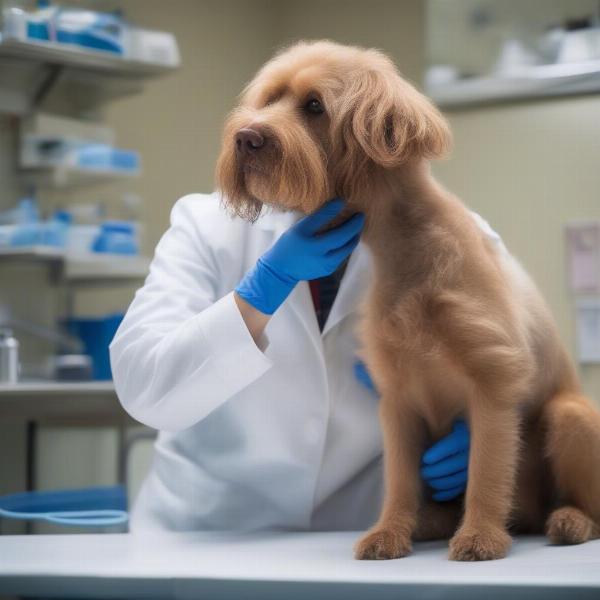Dog biting base of tail can be a distressing sight for any owner. This behavior can stem from various reasons, ranging from simple irritations like fleas or allergies to more complex issues like anxiety or compulsive disorders. Understanding why your dog is engaging in this behavior is crucial to finding the right solution and providing relief.
Understanding Why Your Dog Bites Their Tail
Several factors can contribute to a dog biting their tail. Identifying the underlying cause is the first step towards resolving the issue.
- Parasites: Fleas, ticks, and mites can cause intense itching and irritation, leading a dog to chew or bite at the base of its tail. Regular parasite prevention is key.
- Allergies: Environmental allergies or food sensitivities can manifest as skin irritation, especially around the tail base. Identifying and eliminating the allergen is essential.
- Anal Gland Problems: Impacted or infected anal glands can cause discomfort and lead to tail biting. Veterinary attention is necessary to address this issue.
- Hot Spots: These are inflamed areas of skin that can be itchy and painful. They can occur anywhere on the body, including the base of the tail.
- Behavioral Issues: Anxiety, stress, or boredom can lead to compulsive behaviors like tail chasing and biting. Enrichment and training can help manage these issues.
- Injury or Pain: A tail injury or pain in the surrounding area can cause a dog to bite at the affected region.
Diagnosing the Cause of Tail Biting
If your dog is biting the base of their tail, a visit to the veterinarian is crucial. The vet will conduct a thorough physical examination and may recommend further tests, such as skin scrapings or allergy testing, to determine the underlying cause.
- Physical Examination: The vet will examine the tail and surrounding area for signs of parasites, inflammation, injury, or other abnormalities.
- Skin Scrapings: This test helps identify the presence of mites or other skin parasites.
- Allergy Testing: If allergies are suspected, allergy testing can pinpoint specific allergens.
- Fecal Examination: This can rule out intestinal parasites that may contribute to skin irritation.
 Veterinarian examining dog's tail
Veterinarian examining dog's tail
Treatment Options for Tail Biting
Once the underlying cause is identified, the veterinarian can recommend appropriate treatment. This may include:
- Medication: Antibiotics, anti-inflammatory drugs, or anti-parasitic medications may be prescribed depending on the diagnosis.
- Topical Treatments: Medicated shampoos, creams, or sprays can help soothe irritated skin.
- Behavioral Modification: For anxiety or compulsive behaviors, training techniques and environmental enrichment can be beneficial. This may involve increasing exercise, providing puzzle toys, and creating a calming environment. dog biting at tail base
- Dietary Changes: If food allergies are suspected, a hypoallergenic diet may be recommended.
Preventing Tail Biting
Preventing tail biting involves addressing potential causes proactively. Here are some tips:
- Regular Parasite Control: Use flea and tick preventatives year-round.
- Grooming: Regular brushing helps remove loose fur and debris, reducing the risk of skin irritation.
- Healthy Diet: A balanced and nutritious diet supports healthy skin and coat.
- Environmental Enrichment: Provide plenty of exercise, mental stimulation, and social interaction to prevent boredom and anxiety. dog is biting at base of tail
- Regular Veterinary Checkups: Early detection and treatment of underlying medical conditions can prevent tail biting. residential dog training london
Conclusion
Dog biting base of tail is a sign that something is bothering your furry friend. It’s crucial to take this behavior seriously and seek veterinary attention. By addressing the underlying cause and implementing preventive measures, you can help your dog feel comfortable and happy again. the grown dog bullies its owner
FAQ
- Is tail biting always a sign of a medical problem? Not always. While medical issues are often the cause, anxiety or boredom can also contribute to this behavior.
- Can I treat my dog’s tail biting at home? It’s best to consult a veterinarian before attempting any home treatments. They can accurately diagnose the cause and recommend appropriate solutions.
- How can I prevent my dog from biting its tail? Regular parasite control, grooming, a healthy diet, and environmental enrichment are key preventive measures.
- What should I do if my dog’s tail biting gets worse? Contact your veterinarian immediately if the behavior worsens or if you notice any other changes in your dog’s health.
- Can tail biting be a sign of a serious medical condition? While often caused by minor issues, tail biting can sometimes indicate a more serious underlying medical condition. A veterinary diagnosis is crucial.
- How long does it take for tail biting to stop after treatment? The time it takes for tail biting to stop depends on the underlying cause and the effectiveness of the treatment.
- What are the long-term consequences of untreated tail biting? Untreated tail biting can lead to skin infections, hair loss, and further self-trauma. dog surgery recovery suit
ILM Dog is a leading international dog care website, offering expert advice on dog breeds, health, training, nutrition, grooming, and much more. We provide reliable, practical information to help dog owners worldwide provide the best possible care for their furry companions. From puppy care to senior dog care, we cover every aspect of dog ownership. Contact us for expert guidance and support: Email: [email protected], Phone: +44 20-3965-8624. ILM Dog understands the diverse needs of dog owners and strives to create a global community of responsible and informed dog lovers.